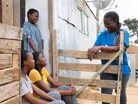HIV Testing Landmark Highlights Ongoing AIDS Problems

A medical milestone was reached this week, by an unheralded healthcare organisation few are likely to have heard of. But it is a significant landmark, and of huge importance.
RMI is a bespoke solutions partner that provides specialist services to protect health and wellbeing in remote and complex locations around the world.
Since 2015, it has been entrusted with the Global Health Supply Chain HIV Rapid Tests Kit project by the US Agency for International Development (USAID). In that time RMI has procured and distributed an estimated 350 million rapid-test kits to 39 countries across Africa, Asia, Europe and South America.
The World Health Organization (WHO) estimates that there are 39 million people worldwide currently living with HIV. The economic impact of HIV/AIDS is substantial. Healthcare costs for the treatment and prevention of the disease are a drain on national budgets, particularly in low- and middle-income countries.
HIV/AIDS has huge societal impact
Societally, HIV/AIDS infection also brings stigma and discrimination, and magnifies existing inequalities, especially for women.
But the supply of HIV-testing kits to communities with limited access to healthcare has helped with global efforts to control the HIV/AID epidemic.
As of 2022, WHO reported that 86% of people living with HIV knew their disease status with testing, allowing many more to be identified for potential treatment.
Operating out of USAID federal office in Washington DC, an RMI team procures rapid-testing kits both for clinical and personal use, and also ensures safe and efficient delivery to communities across the world.
RMI delivers test kits to countries on every populated continent. While Nigeria, Tanzania and Zambia have so far received the highest number of kits, RMI’s outreach also extends into non-African countries, including Nepal, Colombia and, more recently, Ukraine.
Despite logistical challenges, RMI says its team has been able to ensure 89% of orders were delivered “in full or on time”.
RMI CEO Duncan Higham says: “The fight against HIV/AIDS is truly a global effort and the initiative to distribute rapid test kits is a testament to the power of global cooperation and strategic planning in addressing public health crises.
“Despite the challenges that our dedicated team have faced along the way, the supply of over 350 million rapid test kits to 39 countries is an incredible achievement that everyone who has worked on the project should be proud of.
“Access to diagnostic solutions is an important step forward to combating the global HIV/AIDS epidemic, and while we are proud of the number of kits that have been delivered so far, we understand that the past nine years of service have been just the first step in our contribution to this vital cause.”
HIV/AIDS: The global picture
The global HIV/AIDS situation remains a significant public health challenge, with an estimated 38 million people living with HIV worldwide as of 2022. This figure has stabilised in recent years, following a peak in new infections during the late 1990s and early 2000s.
Infection rates vary by region. Sub-Saharan Africa continues to bear the highest burden, accounting for around two-thirds of global HIV cases.
Countries such as South Africa, Nigeria, and Mozambique report substantial infection rates. But the region has also made progress on reducing new infections and increasing access to treatment.
But Eastern Europe and Central Asia are seeing rising infection rates, driven by injection-based drug use and limited access to prevention services.
By contrast, Western and Central Europe, along with North America, have maintained relatively low infection rates, due to widespread access to antiretroviral therapy and prevention programmes.
Several international health agencies lead efforts to combat HIV/AIDS. WHO provides technical guidance and sets global health standards. UNAIDS coordinates the United Nations' response, while the Global Fund to Fight AIDS, Tuberculosis and Malaria mobilises resources for affected countries. National health ministries and non-governmental organisations also play crucial roles in implementation and service delivery.
Who makes HIV/AIDS medicines?
The following are among the antiretroviral (ART) medicines used for HIV treatment. The goal of ART therapy is to reduce the amount of HIV in the body to a level that can't be detected by blood tests.
- Viread, Descovy & Biktarvy (Gilead Sciences)
- Sustiva (Bristol-Myers Squibb)
- Tivicay (GlaxoSmithKline, Pfizer & Shionogi)
- Why Bill Gates & OpenAI Invest in AI Healthcare in AfricaTechnology & AI
- WHO: Inside Global Vaccine Manufacturing & Supply ChainsProcurement & Supply Chain
- Exploring Africa's Vaccine Manufacturing ChallengesMedical Devices & Pharma
- Novo Nordisk: Producing half of the world’s insulin supplyHospitals




